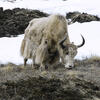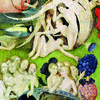You are here
“Perpetrators of incest lead otherwise normal lives”

Several studies carried out since the Second World War suggest that 5% to 10% of children have been victims of incest.1 Are we facing a structural phenomenon?
Dorothée Dussy:2 The numbers are indeed extremely high. Which means we cannot treat each new allegation3 like another in a long line of anecdotal occurrences, but rather as a structural phenomenon. The way we look at sexual abuse of minors has changed over the centuries. The historian Fabienne Giuliani, who studied public perception of incest,4 observed that such abuse within a family has always been condemned, but that the ensuing stigma was mainly directed at the social group. There was no real attempt to acknowledge the victim’s trauma. Only in the past decades was it finally taken into consideration. Although there is evidence of the occurrence of incest in all human societies, anthropology, until my research, had not looked into what it actually represents. Previous studies examined the phenomenon through the prism of who one is allowed to wed in a given society. However, although fathers and daughters know full well they must not marry, this does not stop some fathers, cousins, older brothers – indeed, this is mostly about men – from having sexual intercourse with a child in the family.
In a book to be reissued shortly,5 you maintain that what causes a problem for the family is not so much the act itself but its discovery by others.
D. D.: My research shows that family life is not disrupted by the repeated sexual abuse of one or more children inside the home or at a relative’s. Relationships continue normally, the children go to school, the parents to work, holidays are taken, and so on. The functioning of the family is shattered only once the incest becomes known.
How is incest different from other types of sexual violence?
D. D.: The first difference relates to its length in time. Sexual violence outside the family is a serious, but usually a one-off event. Incest, on the other hand, lasts an average of four years and the silence around it structures family life. Another important distinction is that it is not linked to paedophilia. My study shows that most perpetrators are not sexually attracted to children. Until their first abuse, their sex life is that of normal adult males. They are either married or divorced, have had one or more spouses, and sometimes mistresses. The incest is above all a relationship of power taken to the extreme, which manifests itself through eroticisation and sexuality. The sexual appropriation of vulnerable members of one’s family is a way of showing who’s the boss.
A typical perpetrator is just an ordinary individual then, and not the monster often associated with this type of behaviour?
D. D.: These men do not live in hiding, only coming out occasionally to sexually abuse a child in their family. They are fathers, uncles, older brothers who have been to university, participate in sports, and are socially integrated. Their lives, for all intents and purposes, are no different from any other. In France, the prominent political commentator Olivier Duhamel,6 accused by his stepdaughter of abusing her twin brother 30 years ago, is a prime example. He has been entrusted with some of the most senior positions in the country and can hardly be described as a sociopath. His sexual behaviour should not to be considered from the point of view of pathology, but rather be analysed from a political angle. It is worth looking at the socialisation of young males and ask ourselves why 5% to 10% of them become men who allow themselves to sexually abuse children in their families.
The allegations against him were made in a book written by Camille Kouchner, La familia grande.7 Does it depict the type of behaviour you have studied?
D. D.: In the disclosure of incest between Olivier Duhamel and his stepson, I see some elements that are only hinted at in the book but are similar to accounts I have looked at. One of the characteristics of incest is that it often takes place in families where it has already occurred. In the book, Camille Kouchner suggests, through subtle hints, that her mother, Evelyne Pisier, and perhaps even her sister, Marie-France Pisier, suffered incest at the hands of their father. My study has shown that quick successive deaths in the family, as those described in her book, can also be a sign. Evelyne Pisier’s alcoholism – the study of addiction has shown a preponderance of sexual abuse at a young age in women suffering from this condition – along with the constant erotisation of daily life, as described by Camille Kouchner, are elements I have encountered many times and which often point to the presence of incest in the preceding generation.
For your study, you met survivors, and perpetrators of incest now doing time in prison. How did you broach such a sensitive subject with them?
D. D.: It is not easy for anyone to admit to having been a sufferer or a perpetrator of incest. I therefore chose to approach support groups helping adults who had experienced sexual abuse in childhood. I volunteered several years for an association in France and two years in a social welfare centre in Quebec (Canada), which has developed a highly effective care system for victims of early sexual abuse. I accompanied them to court and also followed several proceedings without knowing the families concerned. With the agreement of the French prison authorities, I met with inmates on a regular basis and was able to speak to them at length. I believe these men wanted to shed light on what they had lived and what others may go through. Speaking to them inside a 2m2 visiting room was hardly a pleasant experience, but there was no awkwardness; the inmates were not in denial of their actions. In the end, what I found most difficult was not so much meeting incest perpetrators or working with victims, but rather how my colleagues reacted to my work.
Why is that?
D. D.: Some twenty years ago, when I first presented my research into incest, most academics studying anthropology, like other disciplines, were men in their fifties or older, who showed no intellectual or emotional interest in the subject of sexual violence. They would go out of their way to delegitimise it by behaving discourteously, such as walking out of the room during my presentation or taking calls through the question-and-answer sessions. I had never experienced this type of behaviour in my previous research work on urban issues in the South Pacific.
Should the laws regarding incest, or the preventive and support mechanisms aimed at both victims and perpetrators be revised?
D. D.: As an anthropologist, my role is not to make propositions, but rather to relay the suggestions put forward by social services. However, I am convinced that teachers, staff working in national education, and paediatricians already know how to detect suspicious situations. There is talk of improving training for identifying child victims, but the problem actually lies with whom to report this information to. Who does one talk to, considering that such facts are never known for certain? With only 2% of cases brought to court ending in a conviction, there is not much point, as it simply ends up dragging the child and their family through a legal nightmare from which no one comes out unscathed. As long as production of evidence has not been thoroughly reformed, offenders will continue to walk away scot-free. I believe we need to work proactively and engage with the perpetrators before a formal legal complaint has even been made.
Could increasing media coverage change public perception of incest?
D. D.: In theory, I believe society is ready because no one thinks incest is acceptable. However, in reality, things are more complicated. It is not just a moral issue. Incest implies a very strong emotional attachment, which makes these situations so painful and difficult to stop across generations. Therefore, I do not know whether growing awareness in our society will actually have any impact on the prevalence of incest.
- 1. Studies show that between 5% and 10% of people in France have been victims of sexual violence during their childhood. Some 80% of cases occur within the family unit. According to an Ipsos poll from November 2020 conducted for the association, Face à l’inceste, one French person in ten claims to have been a victim. Some 32% of people in France say they know at least one victim. Both boys and girls, from all social backgrounds fall prey. On average, the first assault takes place at the age of nine.
- 2. Dorothée Dussy is a CNRS senior researcher at the Centre Norbert Elias (CNRS / EHESS / Avignon Université / Aix-Marseille Université).
- 3. As an anthropologist, Dorothée Dussy opted for the definition of incest used by victims’ associations, which goes beyond biological family links to encompass sexual abuse committed on a child by a person connected biologically or through marriage. “The group can even be extended to include a family’s circle of friends such as a father’s best friend or a cousin through marriage. I have selected a definition that widely covers a child’s family sphere,” she says.
- 4. Fabienne Giuliani, Les liaisons interdites. Histoire de l'inceste au XIXème siècle, Paris, Publications de la Sorbonne, 2014, 478 p.
- 5. Le Berceau des dominations – to be reissued (in French) in April 2021.
- 6. The constitutional lawyer and former socialist MEP Olivier Duhamel was president of the French national foundation of political science (FNSP) until the revelations from his stepdaughter’s book came out on 4 January 2021. Duhamel was also a commentator on LCI, a French 24-hour news channel, a radio presenter on Europe 1, and president of the board of directors of “Siècle”, an influential think tank.
- 7. In La familia grande published by Le Seuil on 7 January 2021, Camille Kouchner claims her twin brother was a victim of incest at the hands of their stepfather, the political science specialist Olivier Duhamel.
Explore more
Author
Specializing in themes related to religions, spirituality and history, Matthieu Sricot works with various media, including Le Monde des Religions, La Vie, Sciences Humaines and even Inrees.













